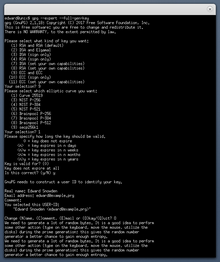
Back جنو برايفسي جارد Arabic GnuPG Byelorussian GnuPG BE-X-OLD গ্নু প্রাইভেসি গার্ড Bengali/Bangla GNU Privacy Guard BS GNU Privacy Guard Catalan GNU Privacy Guard Czech GNU Privacy Guard Danish GNU Privacy Guard German GNU PG Greek
 | |
 Key pair generation process in Unix terminal emulator | |
| Original author(s) | Werner Koch |
|---|---|
| Developer(s) | GNU Project |
| Initial release | 7 September 1999 |
| Stable release(s) | |
| Preview release(s) | |
2.5.2[3] | |
| Repository | dev |
| Written in | C |
| Operating system | Microsoft Windows, macOS, RISC OS, Android, Linux |
| Type | OpenPGP |
| License | 2007: GPL-3.0-or-later[a] 1997: GPL-2.0-or-later[b] |
| Website | gnupg |
GNU Privacy Guard (GnuPG or GPG) is a free-software replacement for Symantec's cryptographic software suite PGP. The software is compliant with the now obsoleted[4] RFC 4880, the IETF standards-track specification of OpenPGP. Modern versions of PGP are interoperable with GnuPG and other OpenPGP v4-compliant systems.[5]
November 2023 saw two drafts aiming to update the 2007 OpenPGP v4 specification (RFC4880), ultimately resulting in the RFC 9580 standard in July 2024. The proposal from the GnuPG developers, which is called LibrePGP, was not taken up by the OpenPGP Working Group and future versions of GnuPG will not support the current version of OpenPGP. [6]
GnuPG is part of the GNU Project and received major funding from the German government in 1999.[7]
- ^ Werner Koch (28 November 2024). "GnuPG 2.4.7 and Gpg4win 4.4.0 released". Retrieved 28 November 2024.
- ^ "Noteworthy changes in version 2.2.43". 16 April 2024. Retrieved 27 May 2024.
- ^ Werner Koch (6 December 2024). "GnuPG 2.5.2 released". Retrieved 10 December 2024.
- ^ Wouters, Paul; Huigens, Daniel; Winter, Justus; Yutaka, Niibe (July 2024). "RFC 9580 OpenPGP". IETF. Retrieved 2024-12-19.
- ^ "Gnu Privacy Guard". GnuPG.org. Archived from the original on 2015-04-29. Retrieved 2015-05-26.
- ^ "A schism in the OpenPGP world". Linux Weekly News. Retrieved 2023-12-09.
- ^ "Bundesregierung fördert Open Source" (in German). Heise Online. 1999-11-15. Archived from the original on October 12, 2013. Retrieved July 24, 2013.
Cite error: There are <ref group=lower-alpha> tags or {{efn}} templates on this page, but the references will not show without a {{reflist|group=lower-alpha}} template or {{notelist}} template (see the help page).